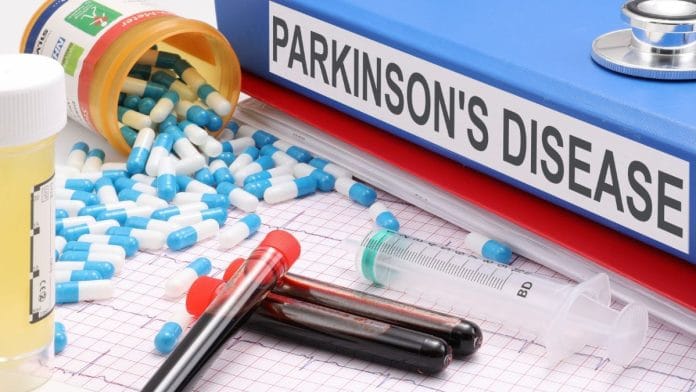Bengaluru: A large international phase 2 clinical trial, while not achieving its primary objective of slowing down Parkinson’s Disease (PD) progression in a year, has shown that a monoclonal antibody known as prasinezumab has the potential to reduce motor decline and decelerate PD’s rapid progression — offering a glimmer of hope to those affected by this debilitating condition.
Prasinezumab is the first experimental therapeutic monoclonal antibody that successfully targets a protein called alpha-synuclein, which is known to accumulate in the brains of PD patients, leading to disease progression.
The findings of the study were published as an exploratory analysis in a peer-reviewed paper in Nature Medicine on 15 April. The phase 2 trial, conducted by researchers from Canada, Germany, Italy, Switzerland, the UK, and the US, is ongoing, and further findings are expected to confirm the antibody’s efficacy.
Over the course of the study and subsequent analysis, the team found that prasinezumab reduced the worsening of motor symptoms in all rapidly progressing types of PDs after 52 weeks. A subsequent 52-week follow-up confirmed the findings, as the trial continues.
Prasinezumab was tested in over 300 patients with early-stage PD but did not have any effect on disease progression, indicating its effectiveness only at or after one year of progression of the disease.
Also Read: India gets 1st homegrown CAR T-cell therapy centre at IIT-B. All about breakthrough cancer treatment
Investigating Prasinezumab’s potential
The monoclonal antibody was first investigated as a potential disease-modifying therapy in early-stage PD.
Through the study called PASADENA, conducted on 316 individuals, the phase 2 trial revealed that the drug had no effect on the progression of PD over one year.
This was true of three types of PD. The first two types, MDS-UPDRS Parts 1 and 2, showed no effects at all. However, researchers noticed that patients of MDS-UPDRS Part 3, which is associated with rapid disease progression, showed varying effects but some slowdown in motor loss rate.
This led the team to hypothesise that the antibody slows down worsening symptoms only in those with a rapid progression of PD.
The findings confirm that the removal of alpha-synuclein is effective in curbing the progression of PD. This and other findings supplement the authors’ initial findings after the PASADENA trial concluded, which stated that no effect was observed in one year.
Additionally, among antibodies tested so far, Prasinezumab showed an actual quantifiable effect in slowing motor progression. This effect was observed to a noticeable and much greater degree in those with rapidly progressing disease.
Meanwhile, in a separate trial conducted in 2022, another antibody named Cinpanemab was evaluated for its effectiveness in treating early-stage PD but did not demonstrate any impact on disease progression across any subgroup.
Limitations of the study
According to the authors, an important emphasis should be made on the fact that this is still an exploratory analysis of a phase 2 study that failed.
Other experts have echoed similar views in an independent statement published by the Science Media Centre, highlighting that more data and long-term trials are needed to confirm the findings, but the initial results seem promising.
“The design of the study is of good quality; you don’t publish in a journal of this level if the study is not well conducted. A different issue is whether the design is adequate to answer the question it aims to answer, i.e. whether the drug improves disease progression. This methodological aspect is a complex and contested issue in the field. What we can say is that the clinical outcome is promising,” said Raúl Martínez Fernández, a neurologist at Puerta del Sur Hospital, Madrid.
He added that an important limitation of the study is the lack of changes in neuroimaging results measuring the dopamine circuitry, which is the primary neurotransmitter for PD.
Currently, another trial called the PADOVA study is conducting a phase 2 clinical trial with Prasinezumab where the findings are expected to be confirmed.
Additionally, the third phase of the PASADENA trial is underway, which involves a five-year follow-up with patients receiving prasinezumab. This phase has one more year to go before completion.
(Edited by Richa Mishra)
Also Read: How does our brain form long-term memories? By breaking & repairing DNA, US study finds







My partner was diagnosed with Parkinson’s disease at the age of 66.. His symptoms included excruciating calf pain, muscular aches, tremors, slurred speech, frequent falls, loss of balance, and trouble standing up from a seated posture. After six months on Senemet, Siferol was given to him in place of the Senemet. It was also at this period that he was diagnosed with dementia. He began seeing hallucinations and became detached from reality. With the doctor’s approval, we stopped giving him Siferol and chose to try the Natural Herbs Center PD-5 protocol, which we had already looked into. After three months of therapy, he has made significant progress. The illness has been completely contained. There are no symptoms of persistent twitching, weakness, tremors, hallucinations, or muscle soreness. The PD-5 Protocol was obtained from natural herbs centre Though you still need to determine what works best for you, I thought I would share my husband’s story in case it could be helpful. Greetings and prayers